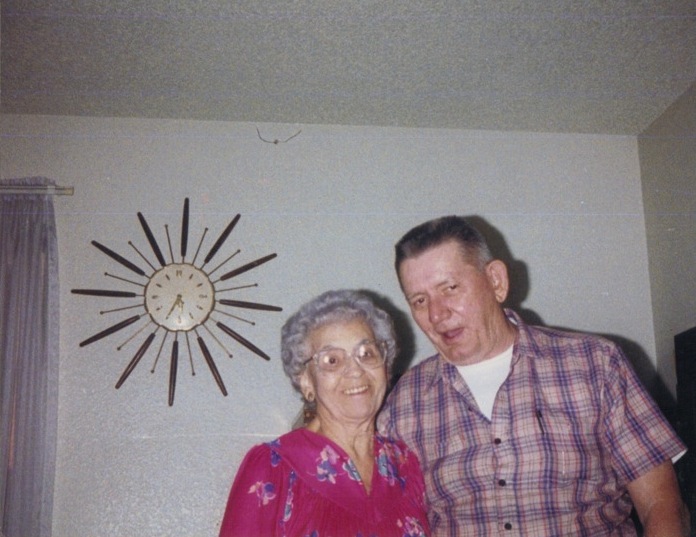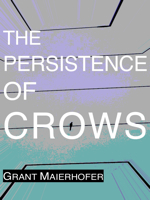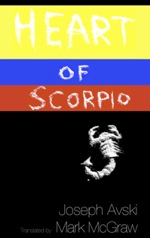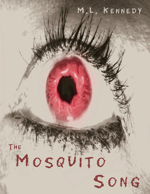
Which way should I turn, I’d sure like to know
Because my heart tells me stay, but my pride tells me go
-Ray Price
My eighty-three-year-old mother had acquired a new boyfriend, and she called me on the phone one day to brag about him. Harry Keesee was sixty years old, and born and raised in Wheeling, West Virginia. He’d just rented an apartment in the senior citizens complex across the hallway from my mother’s, in downtown San Bernardino, California. I was living in Austin, Texas, and I frequently caught a Greyhound bus out to San Bernardino whenever I needed to visit her and take care of her various medical and legal challenges.
Having watched her bury two husbands, I was a bit surprised that my mother initiated the relationship, but when I thought about it, she’d always needed to have a man around to remodel. And except for a couple of my cousins who’d made a lot of money, all men disappointed her, including me.
Over the phone, my mother supplied me with a steady flow of reports concerning Harry’s various faults and weaknesses which, according to her, were legion. He wasn’t sufficiently housebroken to suit her, so she fussed around his apartment, took care of some of his laundry and saw to it that he generally minded his manners and did what he was told to do. “No sex,” she said. “I’m through with that stuff.” But she was clearly enjoying the attention, and susceptible to her own generosity. To Harry’s good fortune, he appeared on my mother’s radar screen at precisely the right time. I suspected that if he conducted a strong campaign, he’d strike pay dirt, even if he did have to sleep in his own bed.
My mother occupied a third-floor corner apartment in a senior citizens’ complex filled with quality furniture, and cupboards brimming with canned goods and baking supplies. She possessed a deep well-spring of sympathy that came to her naturally, and for most of her adult life, she’d fed and nurtured anyone who needed help. A fair number of old coots had taken shots at getting her attention, and whenever I visited my mother, she’d point out the various suitors who’d made a play for her, some of them rolling around the building in wheel chairs with oxygen tubes dangling from their nostrils, and despite ourselves, we’d wind up laughing at their feeble attempts at courting her. But in direct opposition to her generosity, she also nursed a mean streak of undetermined origin that would have intimidated Sonny Liston, and she could instantly abandon the qualities of sweetness and light and transform herself into a pearl-handled .45 caliber bitch. I decided to let Harry discover that for himself.
The opportunity presented itself a few months later when I’d gone out to San Bernardino to visit my mother and meet Harry for the first time. One morning, I stepped out to buy a newspaper and ran into him on the way back to my mother’s apartment. Clutching a candy box, he winked at me, strolled up to my mother’s apartment door and let himself in. “Isn’t that nice,” I thought, “he brings her presents!” My mother must have suddenly slipped into one of her foul moods because suddenly Harry shot out of her apartment, barreled across the hallway towards me, stuck his nose up against mine and bellowed “NOW I KNOW WHY YOU LIVE IN TEXAS!”
Indeed.
And Harry wasn’t the only recipient of my mother’s temper. When I decided to complete a Bachelor’s degree, I enrolled in a writing program in Montpelier, Vermont. Said my mother, “Well, it’s too bad you wasted your whole life, and now you’re going to school!” I used to fantasize chopping her up into small chunks and forcing them down the garbage disposal, but she probably would have somehow reconstituted herself and haunted me for the rest of my life.
Having sized Harry up more carefully, it was apparent to me that he was in fact a hillbilly, a pugilistic cracker with a boxer’s insistent jaw, wide rubbery lips and ears large enough to furnish material for a matching pair. Squat and bandy-legged, his distended gut escaped the lower buttons of his thrift store shirt and supplied his upper torso with forward thrust. He maintained stability with a pair of black Sears work shoes that helped to balance his rolling gait, and he emitted a clear baritone rumble kissed with a rich West Virginia twang. I soon discovered that what issued from his mouth was a mulligan stew of gossip, folklore and a personal history strewn with the debris of broken marriages, hangovers, and the husky residue of a million squeaking miles bouncing along some mysterious two-lane highway. He was wise, rueful, ironic, and as full of shit as a Christmas turkey.
Harry didn’t furnish much personal history. He seemed to have survived on odd jobs and luck. He possessed no real skills other than moving furniture, but he understood the art of self-preservation and I don’t think he went hungry. Once, while my mother was in his apartment, his phone rang, and Harry told the caller that no one by his name lived there. My mother thought it was probably his son, who’d been searching for him for years, but Harry had dynamited that marriage and would never return to West Virginia.
After I got to know him, he revealed that he was a reformed drunk who had spent years delivering furniture throughout the high desert, and had injured himself badly and received a fifty thousand dollar disability payment. His wife drained his bank account while he was in the hospital, and promptly disappeared, leaving him to survive on Social Security checks and whatever else he could scrounge, a thin, hard-scrabble existence that surely weighed heavily upon him. I could picture him, smooth as silk, one day swinging some hot babe around a motel room in Victorville, closing in for the kill, and then suddenly robbed of all his money. “I bought a .45 automatic pistol,” Harry said, “and kept it hidden under the front seat of my pickup. I spent two years hunting for her, and if I’d found her, I’d have shot that bitch dead.”
Back in Austin, I’d been producing a record album, and the process was taking longer than I’d wanted it to, and I kept having to reschedule a trip out to California. I deeply resented having to spend more time away from my project, but I couldn’t see a way out of it, and I was in a foul mood. Eventually, after a few false starts, I freed myself, hopped a bus and headed back to San Bernardino.
I arrived on the appointed morning, and spotted Harry straight off. He’d been watching for me, and he slid up to me and barked “You’re mama’s worried half-to death about you. You get here quicker next time!” He’d become territorial, and wanted me to know that he‘d been keeping an eye on my mother. He’d been distant and formal when we first met, but now he had become the tough bastard, grimacing and glaring at me, and slowly rocking back and forth on his heels, decked out with cheap false teeth, tinted aviator glasses and a lurid red ball cap sporting a WD-40 logo. He stared me down, waiting to see how I’d react. So I barked: “Fuck you, Harry, you don’t even really know me. And don’t run that southern shit past me!” I’d spent a fair portion of my adult life earning my living by playing electric guitar in San Bernardino’s honky-tonks, real honky-tonks, some of them blood buckets, filled with the sons and daughters of the Depression, hard-edged people who took whatever came their way and dealt with it in a forthright manner. If you wanted to make your living as a musician in San Bernardino, you played country music. Period. For my benefit, Harry was foreshortening the space between us, conjuring images of straight razors, guns and ancient, liquor-fueled fights he’d probably conducted years ago, and he was standing his ground to show me he could handle himself. We locked eyes. I already liked him from our first meeting, but I didn’t let on. Then we shook hands. “Well, son, I’m just lookin’ after your mamma. Your mamma’s one of the finest and sweetest women I’ve ever met.” I could feel the sugar sticking to my shoes. But he backed off and cracked a goofy grin, and from that moment forth we got along famously.
There are two basic genotypes of southern men, the one, angular, busy, aggressive, and in a great hurry, the other smooth, patient, nuanced, and filled with jive talk seasoned with the language of certain African Americans. Harry had sprung from the second group. He was Elvis, and not Roy Acuff.
Once I’d unpacked my suitcase, my mother began prompting me to visit Harry, so I dutifully shuffled over to his apartment and banged on the door. Some woman from a city program with an obscure acronym had just delivered his lunch, which seemed to consist of fried meat and gravy, the only food that he would eat. He owned a cot, a couple a TV trays, a blown-out recliner, a tiny black-and-white television and a floor lamp. My mother had hurled herself into improving his diet, but you can’t remodel an old hillbilly’s eating habits. Harry didn’t spend much time in my mother’s apartment, just an occasional quick visit to deliver a few flowers, and he was gone. Domesticity made him nervous, and I’d gotten the feeling that at the least provocation, he was liable to fold up like a card table and vanish.
Buy a CD called “The Essential Ray Price.” Up-load it to your computer. Delete all the tunes on the first side, which are mostly passable compositions written by Hank Williams for Ray Price. Start by listening to “Crazy Arms” and take it to the last tune, ”Pride.” Those ten Ray Price songs comprise one of the greatest bodies of early sixties country music ever recorded, blasting out of honky tonks throughout the entire United States, and up into the farthest regions of western Canada. And if you’re even just half-alive, yield to it, and you’ll start to smell the whiskey, the sawdust, the urinals, the cigarette smoke, the raucous laughter, the clinking beer bottles, the parking lot brawls and the odor of late night breakfasts in some tiny 24-hour cafe where you drank a few cups of coffee before you headed home, the essence of an American way of life that once rolled across the continent, honest, straightforward, driving, and desperately lonesome, just like the men who played it, all of them gone now, along with the honky tonks they used to fill. If you think you’re a country music expert, and you don’t know what I’m talking about, you have a lot of homework to do.
Despite Harry’s apparent vigor, I detected jaundice-like cast to his skin, rheumy eyes, and a distended gut that kept him constantly uncomfortable. He spent a lot of time in his apartment, lying low. My mother had tried unsuccessfully to uncover his medical history, but he wasn’t giving it up, and when she pressed him, he’d shut down. Medicare doctors had slid him through a number of tests, but he wouldn’t reveal the results. We suspected that Harry was fighting a losing battle with liver cancer. His stomach continued to distend. Every step became more laborious for him, and he spent most of his time in bed, curtains drawn. My mother had undergone some major dental work, and the dentist had supplied her with an enormous jar of codeine tablets. Harry found out about them, and started asking for her supply and she gave it to him. He ran through two hundred codeine tablets in just a few weeks, and he starting prompting my mother for more, so she’d refill the prescription for him. On the third round, the pharmacist shut her down. Whatever was torturing Harry seemed to be getting worse, and as it turned out, he’d run through prescriptions all over town, trying to kill the pain. I had to call him and tell him to stop. “All right, son,” he said. And he did, but I knew he’d keep hunting for the pills, and I couldn’t blame him for trying.
He kept searching for pain medication and found it somewhere out on the streets, and when he showed signs of an overdose, he was taken to the San Bernardino County Hospital and locked up in an evaluation ward. My mother found out and went to visit him there, and then she called me. I could picture her, peering through the glass doors, snuffling into a hanky. My elderly mother had chosen an aging drug addict for a boyfriend. I suppose it moved me up the ladder another rung. I made a few phone calls and tried to help him get straight, but I knew he was too far gone, and I left him to the privacy of his own pain and my mother’s manipulations.
During a winter semester, with below-zero temperatures and a chill wind blowing across the campus, a group of women who slept up on the third floor rushed downstairs to wake me up and tell me that Harry had called on the pay phone and claimed it was an emergency concerning my mother. I called Harry, who said “Son, you got to get back here right away!” I asked him what the problem was and he said “Son, your Mama just told me she don’t wanna live another day. You’d better get right back here.” And I answered “Jesus, Harry! There isn’t anything wrong with her. She’s pulling your dick because she wants attention. Haven’t you figured that out yet?” He tried to continue, but I cut him off flat and shouted “Harry, she’s my mother, but she’s you’re goddamned girlfriend. Bring her flowers tomorrow and see what you get, and don’t bother me anymore about it.” Of course, by the next day, Peace and Love prevailed.
My mother had been driving a dilapidated Ford Granada, a rusting baby blue pimp wagon that required constant attention. Deep in my heart, I knew that letting her continue to drive at her advanced age constituted a form of public endangerment, but it finally expired, so she decided to trade it for a newer car, and settled on a 1993 Ford Tempo. Harry promised to help out with the payments, but he couldn’t deliver, so he fussed around with the car, having it washed and polished, and keeping an eye on its various fluid levels.
One morning, my mother fired up the Ford Tempo to go shopping, made a left turn directly in front of a large pickup truck, ripped the front end off of it, and then put the car in reverse and backed into it. When the police arrived, she rolled up the windows and stared straight ahead, fuming. Incredibly, the insurance company offered to rebuild the car. Her next insurance bill was astronomical. I called a banker in Austin, secured a loan, bought the car from her and had title transferred over to me.
I began to make regular voyages out to San Bernardino, where my mother would present me with a list of various chores that, in her view, required immediate attention, meaning that I could expect to spend a few days filling out medical paperwork, visiting pharmacies and buying suppositories for the plugged-up spinsters who lived in my mother’s apartment building. Harry had begun to collect beer cans and recycle them, and I was the designated driver. I didn’t mind it. I’d pop a Ray Price cassette into the player and crank it up till the windows rattled, with Harry sitting next to me and singing along to the tape. And the man could sing, nailing any country tune he knew with a rich, baritone warble. He told me once that in his younger days he’d sat in regularly with country bands and had even won a few prizes.
If I’d brought a guitar along, I’d break it out in my mother’s apartment and bang out some swing chords, delighting him. Harry was a reasonably astute politician. “Son, I used to be a bellhop in Nashville, back in 1949, and I’d listen to Tommy Dorsey’s guitar player working in the lounge. Man, you sound just like him!” And if I’d brought a banjo instead, I’d knock out a little two-step for him and he’d break out in a respectable Buck-and-Wing. Since most of the other tenants were deaf as doorstops, we never had to worry much about bothering the neighbors.
I’d haul Harry to the Barber College, where backlit bottles of red and green hair tonic glittered along a mirrored wall, while tattooed Korean War vets discussed politics and the weather, and then he’d make a quick stop next door at the day-old bakery. It appeared that nearly everyone in south San Bernardino knew Harry, and while we were cruising along 1st street, he began pointing out brake and re-alignment shops, welders, truck drivers and a host of other characters. He knew all the back alleys, the men who ran the old wrestling arena, their names and where they came from, in an area of south San Bernardino about which I knew nothing, entire life stories erased by the prevailing breezes of age and history, some of them probably dating back to the first world war.
Harry’s doctors were unable to fully diagnose what we supposed was cancer, so while I was in San Bernardino, my mother asked me to drive him to the UCLA medical center in Westwood so a specialist could take a look at him. I parked in an underground garage and walked him up to the lobby. I knew he wanted to break and run, but it was far too late for him to play that game.
He looked shrunken and pale then while various doctors poked and prodded him and confirmed our suspicions about his liver, and the doctors also discovered that he’d had several heart attacks and strokes and numerous other serious health challenges he’d carefully hidden from my mother.
I offered to buy him a bowl of soup and led him to a table in the cafeteria. Harry started gawking around and then leaned over towards me and whispered “Hey, man, that Jewish chick is checking you out!” I hissed “Harry, they’re all Jewish chicks. We’re in Westwood. The whole town is full of Jews. Jesus, we’re the only gentiles in the building! Just shut up, man!” But Harry had a good eye for the babes. The Jewish chick was indeed hot, tall, slender, tanned, sporting a luxuriant pile of curly red hair, and giving me the eye while sitting next to her husband, an unfortunate-looking blob who seemed to have been squeezed out of a soft-serve ice cream machine. I hustled Harry into the car and headed back to San Bernardino, dreading having to fill my mother in on his shaky medical condition. I managed to take a few wrong turns on the freeway system and wound up driving past Richard Nixon’s birthplace in Yorba Linda, which had both of us cackling with glee, briefly rolling back the gloomy analysis the physicians had given Harry.
I can remember the last few phone conversations we had, with Harry mostly prompting me to look after my mother. And then she called one night to tell me that Harry had died.
My mother was far more distraught over Harry’s death than I expected; she’d managed to keep a reasonable wall between them, but she was still devastated. Whenever grief encircled her, she’d pour her sorrow into labor, scrubbing, ironing and dusting the furniture. In order to keep herself busy, she offered to clean out his apartment. The managers were delighted, and in return, they offered her Harry’s $200.00 apartment deposit. She accepted it. Within a few weeks, she began receiving phone calls from the coroner’s office, claiming that since Harry was indigent, and the county had covered the cost of his burial, they wanted the deposit money. I told her to be patient, because I was coming out that way, and that I’d look after the problem. No major hospital stores corpses, and I was quite sure that they’d tossed Harry’s remains into a pauper’s grave at Mountain View Cemetery. I called the coroner’s office and asked “What are you going to do if we don’t give you the money?”
It’s been over twenty-five years and I still haven’t received a return phone call.








